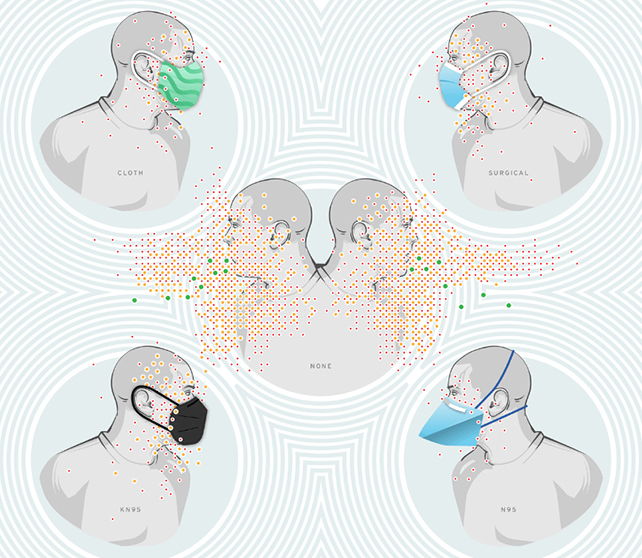Contemplating COVID-19 hasn’t gone away, and we wish to be as ready as attainable for the subsequent potential pandemic, a brand new research into the best sort of face masks gives some vital insights: and there’s a clear winner.
A workforce led by researchers on the College of Maryland within the US requested 44 volunteers with COVID-19 to breathe right into a bespoke gadget referred to as the Gesundheit II Machine, which might measure the variety of virus particles in exhaled breath.
4 completely different masks sorts have been examined this manner, and the contributors have been informed to differ their vocalizations whereas sporting the masks – one of many checks concerned singing “Happy Birthday”, for instance. Every volunteer accomplished a 30-minute respiration session with a masks on, and one other 30-minute session with no masks as a management.
Of the 4 varieties of masks examined, the duckbill N95 masks got here out on prime: it blocked 99 % of enormous particles and 98 % of small particles from getting out into the air. Total, 98 % of the viral load was blocked by the N95.
“The research shows that any mask is much better than no mask, and an N95 is significantly better than the other options,” says Donald Milton, an environmental well being scientist and clinician on the College of Maryland.
“That’s the number one message.”

The researchers additionally examined a material masks (blocking 87 % of viral load), a surgical masks (74 %), and a KN95 masks (71 %). Clearly sporting any masks is lots higher than nothing – however there are additionally vital variations between masks.
Whereas it is considerably shocking for the extensively really helpful KN95 masks sort to complete final, the workforce behind the research means that the quantity of breath allowed to flee across the sides of the masks contributes to the decrease rating.
Nonetheless, the N95 masks sort scores extremely throughout the board: based on the researchers, the facility of the filter within the masks, the tight seal fashioned across the edges in opposition to the pores and skin, and the additional area for breath to maneuver contained in the masks all contribute to its success.
“Data from our study suggests that a mildly symptomatic person with COVID-19 who is not wearing a mask exhales a little over two infectious doses per hour,” says epidemiologist Jianyu Lai, from the College of Maryland. “But when wearing an N95 mask, the risk goes down exponentially.”
This specific research did not have a look at virus particles going within the different course: in different phrases, how a lot safety the masks would provide to a wearer in opposition to virus particles that may be presently circulating within the air.
The varieties of masks included within the research have been additionally restricted, and the authors say they “should not be considered representative of all N95, KN95 respirators, and surgical masks.”
Along with vaccinations, masks play a significant position in limiting the unfold of respiratory pathogens like SARS-CoV-2, liable for COVID-19 – and the extra knowledge we will collect about completely different masks sorts, the higher.
“Duckbill N95 masks should be the standard of care in high-risk situations, such as nursing homes and health care settings,” says Lai.
“Now, when the next outbreak of a severe respiratory virus occurs, we know exactly how to help control the spread, with this simple and inexpensive solution.”
The analysis has been printed in eBioMedicine.

